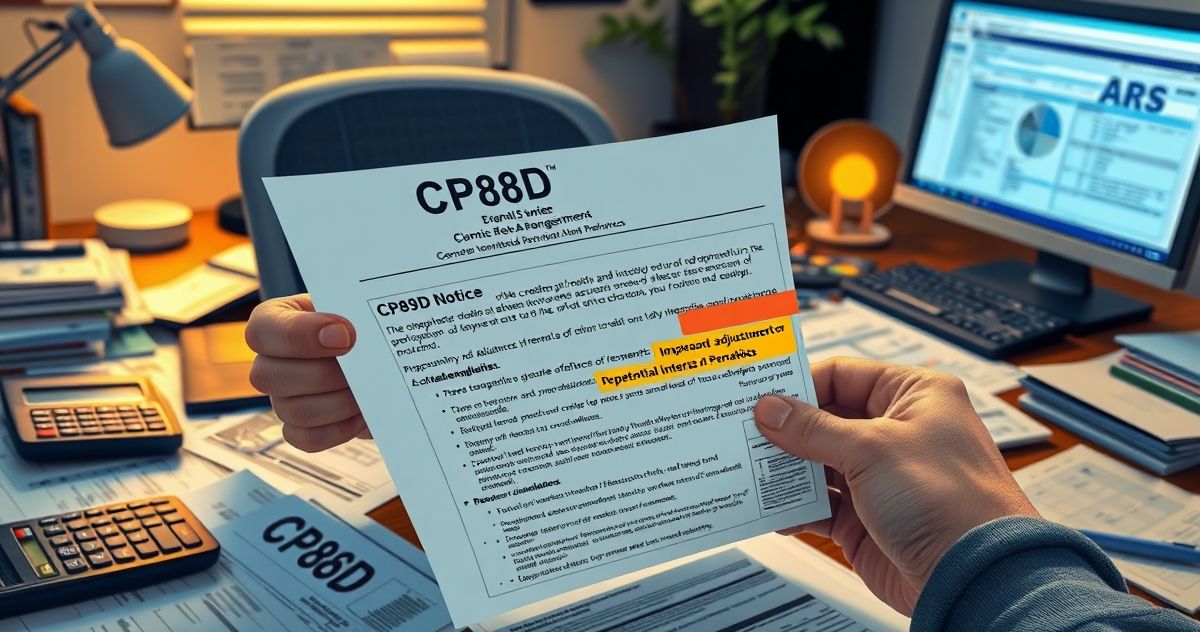Understanding the CP89D Notice: A Comprehensive Guide
The CP89D Notice is a communication from the Internal Revenue Service (IRS) designed to inform taxpayers about substantial changes made to their tax accounts. Such a notice is typically issued when the IRS uncovers discrepancies, inconsistencies, or errors in previously filed tax returns. Whether the change affects reported income, credits, or deductions, the CP89D Notice serves as an official record of these adjustments and is critical for taxpayers to understand and address promptly.
What is the CP89D Notice and Its Primary Purpose?
The fundamental purpose of the CP89D Notice is to keep taxpayers informed about modifications to their tax filings. It highlights corrections that might arise from mismatches between third-party data (like W-2s or 1099 forms) and what was initially reported by the taxpayer. The IRS uses such notices to foster transparency and maintain accuracy in the tax system, which allows both the IRS and the taxpayer to keep accounts up-to-date and fair.
Key Features of the CP89D Notice
- Explanation of Adjustments: This section specifies the exact nature of the adjustments. Detailed information is provided about which elements of the taxpayer’s account were corrected and why. Common adjustments include income corrections when discrepancies are found between IRS records and those reported by the taxpayer.
- Impact on Refunds or Balances: The CP89D Notice will indicate whether the changes result in a balance due from the taxpayer, a reduced refund, or possibly an increased refund. It includes the revised total, indicating the new obligation or adjustment.
- Potential Interest and Penalties: If adjustments lead to an underpayment, the CP89D outlines applicable interest and penalties. It also provides instructions for handling these charges and the timeline for payments.
Relevant Filing and Compliance Requirements
Upon receiving a CP89D Notice, taxpayers must carefully review and address any stated discrepancies. While some changes might warrant an amended return, others could require immediate payment or submission of additional documentation to support prior claims or deductions. The Notice will often include a deadline by which action is required to avoid further penalties.
Taxpayers are encouraged to maintain comprehensive and organized financial records. This level of detail will aid in avoiding errors in future filings and ensure readiness if a dispute with the notice arises.
Penalties and Consequences for Non-Compliance
Ignoring a CP89D Notice can lead to significant financial repercussions. If unaddressed, the IRS will continue to impose interest and penalties on any outstanding balance due, compounding the original amount. In extreme cases, the IRS may take enforcement actions such as levies or liens to recover the debt.
Lack of response or overdue action may also raise the likelihood of an IRS audit, making compliance and timely responses essential for minimizing risks and safeguarding financial stability.
The Importance of the CP89D Notice in Tax Resolution
The CP89D Notice is pivotal for identifying errors early and allowing taxpayers to rectify them before they escalate into larger issues. By proactively managing these notices, taxpayers can negotiate more favorable terms with the IRS when necessary, such as installment agreements or offers in compromise, based on their unique financial situation.
Moreover, addressing a CP89D swiftly can lead to minimized penalties and a smoother resolution process, thereby preventing enforcement measures that can significantly impact one’s financial health. It also highlights the continuous interaction needed between taxpayers and the IRS, emphasizing the importance of staying informed and involved in one’s tax affairs.
Conclusion
The CP89D Notice serves as a critical touchpoint for taxpayers and the IRS, ensuring all parties are in agreement regarding tax account accuracy. Neither wilful ignorance nor procrastination is advisable. Instead, prompt action and open communication can prevent future liabilities and protect against unnecessary debt. Understanding and managing a CP89D Notice is essential for maintaining healthy financial compliance and avoiding potential pitfalls.

